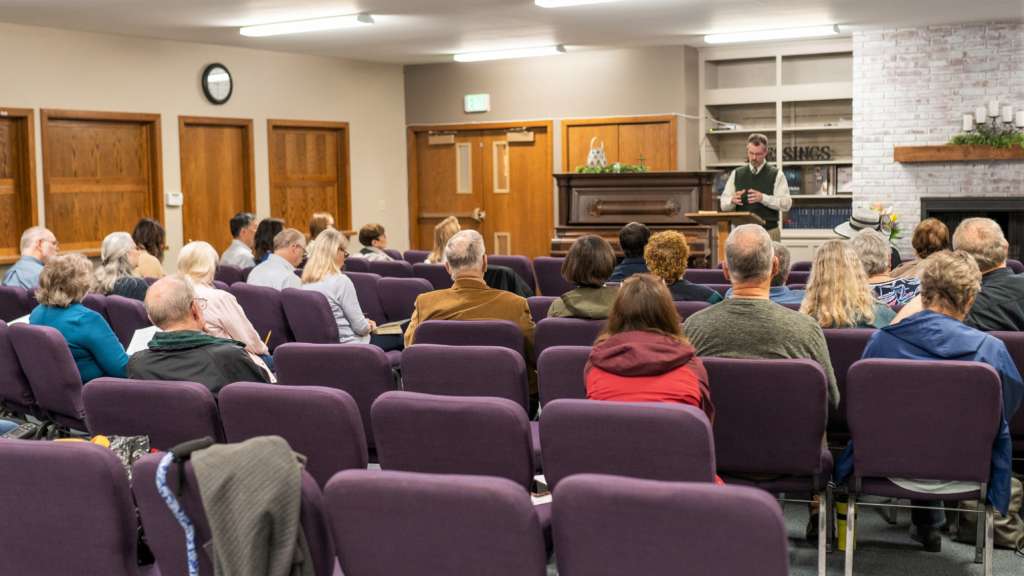
What We Teach
Doctrine matters. What we believe about God and His Word impacts every area of our lives. The following summarizes what we teach at Immanuel Bible Church. We seek to present every person complete in Christ (Colossians 1:28).
The Bible. We accept the Holy Scriptures, as originally given, as the inspired, infallible and inerrant word of God. Recognizing them as our sole authority in all matters of faith and practice, we teach the doctrines taught therein.
(Matthew 5:18; 24:35; John 10:35; 16:12-13; 17:17; 1 Corinthians 2:13; 2 Timothy 3:15-17; Hebrews 4:12; 2 Peter 1:20-21)
God. There is one true and living God, the Holy Trinity of Divine Persons in perfect unity, unchanging, co-equal, co-eternal, Father, Son, and Holy Spirit, and sovereign in creation, providence, and redemption.
(Deuteronomy 6:4; Isaiah 45:5-7; Matthew 28:19; 1 Corinthians 8:4)
God the Father. He is the Father of our Lord Jesus Christ, who is holy, righteous, full of grace and love. In His infinite love, He sent forth the Son, that the world through Him might be saved.
(Psalm 103:19; John 1:12; Romans 8:15, 11:36; Galatians 4:5; Ephesians 1:11; Hebrews 12:5-9)
Jesus Christ. He is the Lord, the only incarnate Son of God, born of the Virgin Mary, conceived by the Holy Spirit, in consequence of which His manhood was real and sinless, and His teaching free from error; that by His death on the cross He made substitutionary atonement and a perfect offering for our sins; that He triumphed over death, sin and Satan; that He rose bodily from the grave, ascended into heaven, where He now sits at the right hand of God.
(Isaiah 7:14; Matthew 1:23, 25; John 5:23, 5:26-29, 10:30; Romans 3:24-25, 4:25, 8:34; First Corinthians 15:20, 23; Philippians 2:5-8, Hebrews 7:25, 9:24, 10:11-14; First Peter 2:24)
The Holy Spirit. He is the third Person of the Godhead, and the Agent of regeneration, by whom men are brought to conviction, repentance, and faith in the Lord Jesus Christ, and who indwells the believer for sanctification. The Holy Spirit guides the worship and ministry of the Church and empowers its life and witness.
(John 3:5-7, 16:7-9, 13-14; Ephesians 1:13; 2 Corinthians 3:18)
Man. As a result of the Fall human nature became guilty and depraved, so that all men are subject to the penalty which, in His wrath, God has decreed against sin. Notwithstanding, those who remain unrepentant are fully responsible for their willful continuance in sin and unbelief.
(Psalm 14:1-3; Jeremiah 17:9; Romans 3:9-18, 23; 5:10-12)
Salvation. Through faith alone in the Lord Jesus Christ, and on the basis of His death, sinners are freely justified by God, who forgives all their sins as they are reckoned to Christ, whose righteousness is reckoned to them. Salvation is therefore by grace, and not by human merit or work.
(John 1:12; First Corinthians 1:30; Second Corinthians 5:21; Ephesians 1:7; 2:8-10; 1 Peter 1:18-19)
The Church. Those who are chosen by God the Father and redeemed by the blood of the Lord Jesus Christ and sanctified by the Holy Spirit are members of the universal Church, the body of which Christ is the head. Begun at Pentecost, distinct from Israel, this Church finds visible expression in local churches, each of whom should manifest union with Christ in preserving the purity of life and doctrine, avoiding schism and heresy.
(Romans 11:1, 25-27; First Corinthians 11:18-20; Colossians 1:18)
The End. The Lord Jesus Christ will take up His church in a visible, personal return. God’s wrath will be poured out upon a rebellious world in a massive seven-year judgment. Israel shall be restored to her own land in the Millennial Kingdom. There is to be a resurrection and final judgment of all men, ushering in eternal blessedness for believers and eternal punishment for the wicked.
(Isaiah 65:17-25; Matthew 25:31; John 5:29; Romans 11:25-29; First Corinthians 15:51-53; First Thessalonians 4:16; Second Thessalonians 2:7-12; Revelation 20:1-7, 13-15)
For a more detailed statement, click here: “What We Believe.” The preceding summary is adapted from the Union School of Theology.
